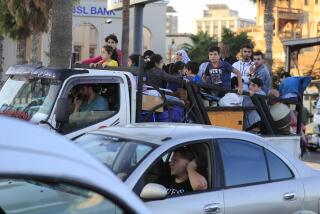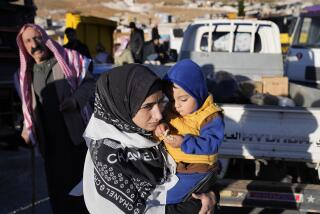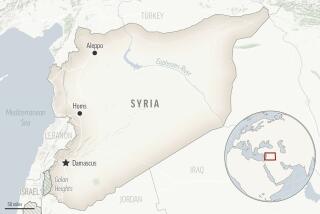Syrian forces, aided by Russian airstrikes, move closer toward a siege on Aleppo
Reporting from Beirut — Pro-government forces backed by Russian airstrikes consolidated their grip Friday on strategic terrain in northwestern Syria, escalating an offensive that has pushed thousands of civilians toward Turkey and raised the prospect of a siege on the long-divided city of Aleppo.
The Syrian army, backed by allied forces, had restored security and stability to the formerly opposition-held towns of Rityan and Mair, northwest of Aleppo, after ousting “terrorists,” reported Syria’s official media, which refers to all rebel groups as terrorists.
Opposition social media reported that rebel groups, including Al Qaeda’s Syrian affiliate, Al Nusra Front, were engaged in fierce clashes with government forces in the area.
Al Nusra and another Islamist group, Ahrar al Sham, are among the major rebel factions that hold sway in the Aleppo area, along with Western-backed units of the opposition Free Syrian Army.
Propelling the ongoing offensive are Russian airstrikes and the presence of Iranian, Iraqi and Lebanese militiamen bolstering the forces of the government of Syrian President Bashar Assad, according to various accounts.
Thousands of civilians were reportedly fleeing toward Turkey, but many were stranded at the Bab al Salam crossing on the Turkish border. Images circulating on the Internet showed multitudes of Syrians trudging toward the border zone with suitcases and bundles.
Turkey, which is home to more than 2 million Syrian refugees but has lately tightened its borders with Syria, was not allowing the latest group to enter the country, according to reports from the area.
Moscow has lately ramped up its Syrian air campaign, which began in September and has helped turn the tide in the almost five-year war in favor of Assad’s forces.
The Obama administration and its allies have called for a cease-fire in Syria and blamed the Russian escalation in part for the breakdown this week of peace negotiations in Geneva.
But the Russian and Syrian governments blame the opposition and its backers for the talks’ suspension and contend that any cease-fire should be negotiated rather than made a precondition for resumed dialogue.
The current offensive is the Syrian government’s boldest move in years to reassert its control of Aleppo, a city divided into spheres of government and opposition control since July 2012.
Reasserting full control of Aleppo, once home to more than 2 million people, would be a huge victory for the government in Damascus and its Russian partners and a momentous setback for Syrian rebels.
The heavy Russian involvement has further soured relations between Russia and Turkey, which have been engaged in a war of words since Turkish forces shot down a Russian warplane in November above the Syrian-Turkish border region. Turkey is a major supporter of rebels fighting to oust Assad.
NEWSLETTER: Get the day’s top headlines from Times Editor Davan Maharaj >>
Turkish Prime Minister Ahmet Davutoglu, speaking Thursday in London at a donor conference for Syria, estimated that 70,000 people were on their way to Turkey “due to actions by pro-Assad and Russian forces in the region,” according to a Turkish state news agency Anadolu.
The Turkish premier also accused Damascus of wanting to create “a siege of starvation” in Aleppo, once Syria’s economic hub. Years of fighting and bombardment have heavily damaged Aleppo, including its historic ancient quarter, a UNESCO World Heritage site.
Syrian officials say they aim to shut down opposition supply routes from Turkey, long a key logistics and supply hub for rebel forces.
Damascus says that retaking Aleppo would represent a defeat for Assad’s opponents and put an end to rebel mortar and rocket attacks into government-held western Aleppo, still home to more than 1 million people. For years, the opposition and human rights groups have accused the government of indiscriminate bombardment of rebel-held neighborhoods in the city.
Aid agencies and the opposition say the intensified fighting has severed the main routes for humanitarian aid entering insurgent-held eastern Aleppo, where more than 200,000 people still reportedly reside.
“We are cut off from Aleppo city,” David Evans, regional program director for the charity Mercy Corps, said in a statement. “It feels like a siege of Aleppo is about to begin.”
Government forces have been making advances in the Aleppo region for weeks, but the thrust forward has intensified in recent days.
On Wednesday, the Syrian army said its forces had ended sieges of a pair of pro-government towns, Nubul and Zahra, with majority Shiite Muslim populations. The towns, home to more than 30,000 people, had been encircled for more than three years by Sunni Muslim rebel groups, including Al Nusra Front. Government forces air-dropped food and other crucial supplies.
Some Islamist groups among the opposition view Shiites, as well as members of the Alawite sect, whose adherents include Assad, as apostates to be killed.
With their security situation deteriorating, extremist leaders issued public appeals for a call to arms among militants.
“Oh, youth of Aleppo; oh, sons of Aleppo; oh, civilians; take up weapons and set off; for it will be either the [Shiites] or us,” exhorted Abdullah Muhaysini, a prominent Al Nusra Front cleric, in an audio address released on social media Wednesday.
A photograph published in Kayhan News, an Iranian website, showed an image of smiling fighters identified as Iranian elite Quds Force members celebrating their entry this week into the formerly rebel-besieged Shiite town of Nubul. Shiite-led Iran says it has only dispatched advisors into Syria, not ground forces.
Opposition activists said Russian warplanes had launched hundreds of attacks in recent days in the Aleppo area, contributing to a mass exodus of civilians.
“Every village entered is completely destroyed with the bombing,” said Alaa Al-Din, an opposition activist based in Azaz, about 25 miles north of Aleppo city, close to the Turkish frontier.
Turkey’s IHH Humanitarian Relief Foundation reported that more than 50,000 people had massed near the border.
In addition, hundreds of families had escaped to the Kurdish enclave of Afrin, about 25 miles northwest of Aleppo, which is under the control of Syrian Kurdish forces.
“From the morning, we are trying to get tents for people. We have too few tents; most people are sleeping on the ground,” Shyaar Mahmoud, administrator of the Robar refugee camp in Afrin, said in a phone interview Friday. “They are still coming, and we have no space for them.”
Twitter: @mcdneville
McDonnell is a Times staff writer and Bulos is a special correspondent. Special correspondents Ramin Mostaghim in Tehran and Kamiran Saadoun in Irbil, Iraq, contributed to this report.
ALSO
Missing Hong Kong booksellers detained in China for ‘illegal activities’
Magnitude 6.4 earthquake strikes southern Taiwan; several buildings collapse
‘How sweet it is,’ WikiLeaks’ Julian Assange declares after U.N. panel backs his freedom
More to Read
Sign up for Essential California
The most important California stories and recommendations in your inbox every morning.
You may occasionally receive promotional content from the Los Angeles Times.










